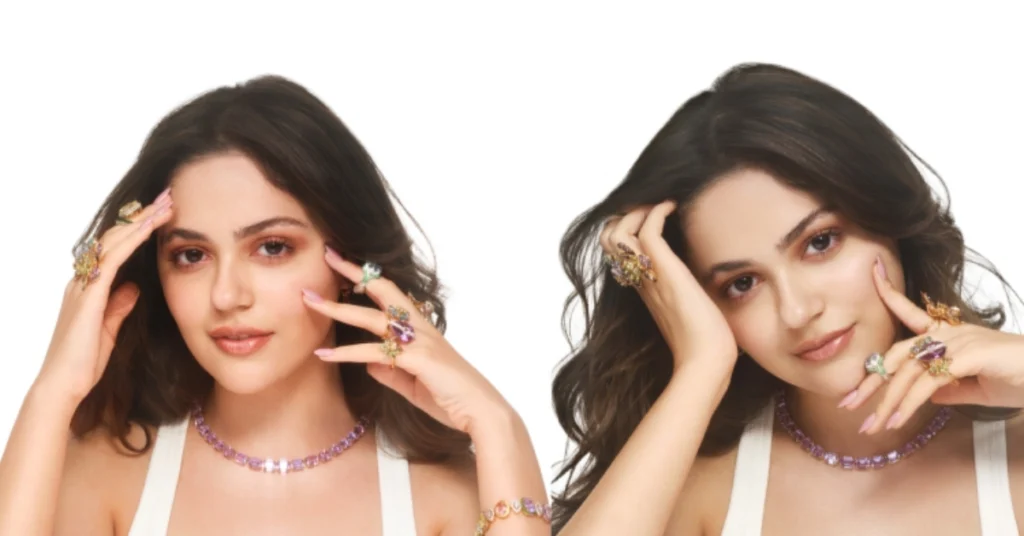India’s beauty playbook, for decades, has been nothing more than a manual of perfection with glass-like smooth skin, carved cheekbones and promises of a full coverage foundation having the abilities to magically turn you into something else entirely. Hide, polish, perfect was the motto, and billboards, magazine covers and campaigns all championed for the same thing.
With the start of 2025, the emergence of a newer generation, and their rejection of conformity, the surface of beauty’s shiny veneer has been peeled back to reveal skin in texture, rawness and unapologetic glory. This is seen in global brands such as “Rare Beauty” and “Rhode” putting skin tints on the roster instead of full coverage. A new generation—Gen Z—wants something different. They want texture. They want realness. They want blemishes and freckles not just perfection.
In India, the appointment of Aneet Padda by a renowned cosmetic brand is seen by many as more than just a marketing gimmick. Through its official channels, the cosmetic brand has said that the partnership’s focus is meant to speak to Gen Z’s changing beauty codes to reflect natural luminosity, self-expression and “skinified” products versus traditional glammed up full coverage.
What Gen Z Actually Wants?
This shift in beauty is not just brands catching up; research shows it is real and measurable. According to Mintel, nearly one-third of Gen Z in India prefers addressing skin issues like acne or dark circles through lifestyle changes—better sleep, diet, and stress management—rather than piling on products. Dermatologists also note younger clients prioritize skin health and texture over drastic changes.
Gen Z’s skin concerns—acne, dryness, uneven tone—mirror older generations, but their approach is different. Instead of concealers to mask, they ask, “What ingredients will heal?” Heavy contouring is replaced with lightweight tints, serums, and breathable coverage. This reflects a larger global movement, inspired partly by K-Beauty’s rise and its focus on radiant, natural-looking skin.
Transparency, ethical sourcing, and ingredient innovation matter deeply to this generation. They reject faceless brands selling false miracles, demanding science, honesty, and relatability. Cosmeceuticals now dominate conversations, with niacinamide, vitamin C, and glycolic acid entering everyday vocabulary.
Having grown up between filtered selfies and “no-makeup” tutorials, Gen Z is rejecting unattainable perfection. Their idea of beauty is fluid, authentic, and experimental—driven not by hiding flaws but by nurturing skin health and embracing individuality.
Social Media and it’s Mixed Bag
The same platforms that popularized “filter face” are also fueling its backlash. Instagram and TikTok, once dominated by hyper-edited selfies and beauty filters, now host powerful movements like #SkinPositivity, #NoFilter, and #AcnePositivity. These hashtags encourage users to share unfiltered images of skin with acne scars, freckles, vitiligo, or natural texture, challenging years of unrealistic beauty standards.
Social media has been a double-edged sword. On one hand, endless flawless feeds create insecurity, anxiety, and impossible expectations. On the other, these new movements provide representation and community for people who rarely saw themselves reflected in traditional media. Unlike millennials who consumed retouched celebrity images in magazines, Gen Z is engaging in real time with peers who are equally flawed but unapologetic, creating safe spaces for authenticity.
This evolution is reshaping beauty conversations. It is no longer shocking to see influencers post bare-faced selfies or “getting real” moments about acne, with such content now celebrated and respected.
At Christ University in Bengaluru, 21-year-old Serena Kaul reflects, “I used to cake on foundation because influencers looked poreless. Now my friends and I post bare-faced selfies all the time. Seeing others embrace flaws gave me courage.”
Their stories highlight a paradox: while Gen Z embraces authenticity, they still live under the gaze of beauty culture. The decision to post bare-faced selfies often coexists with the pressure to keep up a 10-step skincare routine or use products branded as “clean” or “authentic.”
Redefining Makeup: From Cover-Up to Play
The beauty industry has long mirrored society’s ideals. In the 2000s, advertisements often promoted fairness, while the 2010s emphasized heavy matte foundations and contouring. Today, Gen Z rejects both extremes, demanding authenticity over perfection. They want to see freckles, scars, stretchmarks, and visible skin texture in campaigns, with makeup that highlights individuality instead of masking it.
For older generations, makeup was often about covering flaws—dark circles, blemishes, or uneven tone—to conform to narrow beauty standards. Gen Z, however, treats makeup as play and self-expression. Eyeliner is no longer confined to neat black wings; it can be metallic pink, neon green, or shaped abstractly. Lipstick extends beyond classic reds and nudes to metallic blues, ombrés, or pastels. Glitter freckles, bold blush across the cheeks and nose, or rhinestone embellishments all speak to creativity, not concealment.
Also Read: Roadmap to Flawless Skin: Understanding and Treating Acne Scars
This shift reframes makeup as empowerment rather than disguise. Beauty is no longer about erasing one’s identity but enhancing it. For younger consumers, perfection is irrelevant; what matters is fun, freedom, and authenticity. Their embrace of experimental, fluid styles signals a cultural move away from rigid ideals toward beauty as an evolving, personal, and expressive journey.
The future of beauty in India is shifting from concealing “imperfections” to celebrating them. Dermatology is evolving into a holistic approach to skin health, with skincare focusing on hydration, nourishment, and care rather than erasing wrinkles or bleaching spots. Makeup, too, is moving beyond rigid ideals, embracing individuality and creating personalized looks that reflect identity and personality.
This is more than a passing trend—it is a cultural movement. Gen Z demands accountability, diversity, and authenticity from the beauty industry. For them, products are tied to values, reshaping how beauty is marketed and understood. Their choices are forcing a shift from unattainable perfection toward inclusivity and honesty.
For a generation raised on filters, authenticity has become a rebellion. By embracing flaws, experimenting with play, and rejecting limits, Gen Z is proving that beauty is no longer confined—it is fluid, diverse, and boundless.



